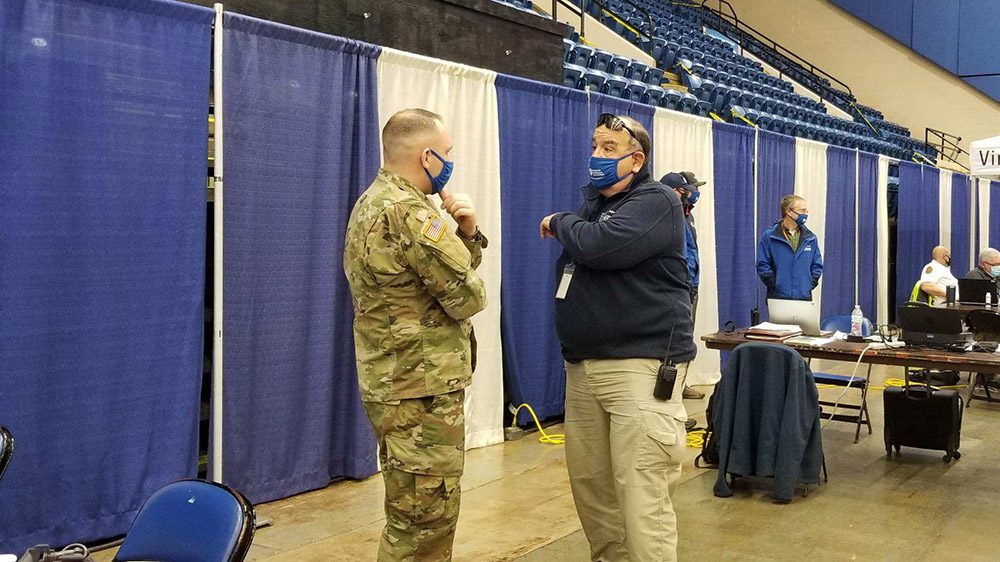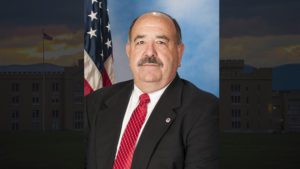Foresman ’83: Emergency Management During a Pandemic

Robert H. Foresman ’83 helps with the January COVID-19 vaccine distribution event in Roanoke, Virginia. – Photo courtesy Forseman.

Robert H. Foresman ’83 helps with the January COVID-19 vaccine distribution event in Roanoke, Virginia. – Photo courtesy Forseman.
It is doubtful that Robert H. Foresman ’83 will ever forget his first day as a public health emergency coordinator for the Roanoke-Alleghany Health District of the Virginia Department of Health. The reason is a simple one: On that day, March 3, 2020, he received his first briefing on COVID-19. He chuckles when he remembers the meeting’s setting. “We were gathered in a conference room with no social distancing.”
Although Foresman was new to the VDH, he was not new to the field of emergency management. In fact, he will mark 40 years of volunteer and professional service in 2021, service that began when he was still a cadet. “My father—Hank Foresman Sr. ’41—instilled in my brothers and me the concept of giving back to our country through service. I could not serve in the military for physical reasons, so in 1981, I joined the Lexington Fire Department.”
Foresman remained active in the department as a firefighter and an emergency medical technician until 2004, and he served as its chief from 2000-04. He looks back at his time with the department with fondness. “I immensely enjoyed serving the community, responding to calls, and helping people—many of whom were having one of the worst days of their lives.”

Foresman has been a leader in professional associations related to emergency management, and he is Virginia Emergency Management Association’s current president.
He found his experience leading the department rewarding and instructive. “You learn fast that it is different leading volunteers than it is career staff. You learn to be a good listener and appreciate varying perspectives. The greatest lesson was the necessity to adapt, to change on the fly, based on new information.”
In 2006, Foresman decided to apply his experience as a firefighter, teacher, and school administrator full time to the field of emergency management and planning. Asked what spurred this career change, he replied, “It’s simple. Emergency management would allow me to broaden the scope of my service and have a positive impact on a greater number of people.”
Foresman served as Rockbridge County’s emergency management and hazardous materials coordinator for 11 years. In that position, he dealt with a wide variety of emergencies, to include the largest wildfire in Virginia’s history, the fire that destroyed the historic Lexington Presbyterian Church in July 2000, and severe winter storms—the most notable was the winter storm of 2009 that closed I-81 for 28 hours and required a full-county response. Many of the stranded motorists were rescued by firefighters and EMS personnel utilizing four-wheelers, and numerous mass casualty events occurred, including two airplane crashes in which a total of six people died. “Most people never respond to an airplane crash in their careers,” said Foresman. “Either I was blessed or extremely unlucky to lead the response on two during my career.” It is interesting to note that one of his achievements was the development of a regional plan to deal with pandemic flu. In 2014, the Virginia Emergency Management Association named him the Virginia Emergency Management Professional of the Year. In 2017, Foresman took on the responsibility of being the Henrico County Division of Fire’s senior emergency management planner.
You learn to be a good listener and appreciate varying perspectives. The greatest lesson was the necessity to adapt, to change on the fly, based on new information.
Robert H. Foresman '83
Foresman has been a leader in professional associations related to emergency management, and he is Virginia Emergency Management Association’s current president. He says engagement in these organizations is “important,” because it helps “build relationships within the profession. Let me put it this way, you don’t want to meet someone for the first time on the scene of a disaster or emergency.”
“Additionally,” he continued, “I have a responsibility to share my experiences with the next generation of emergency managers so they can navigate the challenges they’ll face.”
Since last spring, Foresman has led a team responsible for coordinating the response to the virus and its effect by local organizations—like hospitals, emergency medical service crews, and law enforcement—in the Roanoke Valley and Alleghany County areas.
Foresman remembers his initial days in the job. “I focused on coordinating resources for the health department, and very quickly it turned into coordinating with our local partners to ensure that cases were identified and to provide them guidance on isolation and quarantine. One of the early issues that is still with us is the lack of personal protective equipment. The supply chain has improved, but it is not where it was pre-COVID due to the demand worldwide.”
Asked to compare this event to others he’s experienced, Foresman replied, “It’s the same in that the primary goals are life-safety issues, incident stabilization, and property preservation. COVID is different in its duration. Most disasters are over in a matter of hours or days. This event has lasted more than a year, and it’s likely to continue for another several months until enough vaccines are distributed to achieve national herd immunity.”
Foresman provided some advice for those now working in emergency management. “First, be flexible. Second, commit to being a good listener and open to ideas. Finally—and this is critical—disconnect when not on duty, practice self-care, and focus on family.”
Asked what traits leaders in the field need to cultivate now, Foresman stated, “The most important trait is patience. This event will last a good while longer. Next, again, flexibility is key. This situation still changes multiple times a week, at times a day. The final thing is to stay focused on the end goal and don’t let distractions pull you off course.”
Patience is something Foresman hopes the public has, too. “No one responding to this pandemic—medical professionals, emergency services personnel, researchers, scientists, public officials—has dealt with a pandemic, and we are all learning as we go.
“As to vaccine distribution, everyone is working hard to distribute the limited amount of vaccine available, especially to our most vulnerable, such as the elderly. As soon as more vaccine is available, more locations for vaccine distribution will open, and more Virginians will be vaccinated.”
Foresman also wanted the public to know the character of his colleagues. “I work with the greatest team of healthcare providers in Virginia. Their work ethic and empathy for their patients is amazing as is how we have come together as a family.”
As to the role he has played, “As I have been throughout 40 years of service, I’m honored and grateful to help my fellow Virginians during this emergency, and I’m humbled to work with so many dedicated and selfless professionals.
“So much of what I have accomplished throughout my career was cultivated during my time at VMI, where I developed the skills needed to be successful. I am honored to say that I have played a small part in the success of Virginians across the Commonwealth. Finally, what I’ve been able to do is because of the support from my family, especially my wife, who has put up with my long days and crazy schedule and patiently listened to my stories and my gripes.”

The communications officer supports the strategy for all communications, including web content, public relations messages and collateral pieces in order to articulate and promote the mission of the VMI Alumni Agencies and promote philanthropy among varied constituencies.